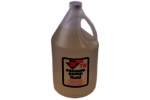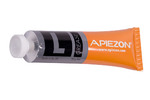- ▶
- Heaters/Source
- ▶
- Agilent Heaters and SensorsMass Spectrometry, Scientific Supplies & ManufacturingScientific Instrument Services 5973 Source Heater Tamper Resistant Allen Wrench 5973/5975 Quad Sensor 5985 Source Heater Assembly Agilent Interface Heater Assembly 5971 Interface Heater
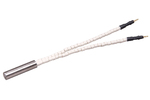
- ▶
- VacuumPumps Oils/Greases Gauge & Tubes Hose & Accessories Filters - Oil/Charcoal Foreline Traps Gaskets & Material Fittings O-Rings Pump Parts (Precision Plus) Quality Monitor System Distillation Control Acoustic Enclosures For Rotary Vane Pumps Other Vacuum Accessories Digital Vacuum pressure regulator (VPC) Catalog Page F1
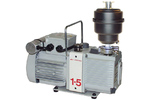
- ▶
- Oils/Greases
- ▶
- Apiezon Oil/Grease/Wax
- ▶
- Oils (This Page)
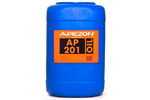 Apiezon Oil AP 201 AP 201 "booster" pump oil is based on a hydrocarbon oil but, unlike other Apiezon hydrocarbon oils, it is strongly resistant to oxidation.
Apiezon Oil AP 201 AP 201 "booster" pump oil is based on a hydrocarbon oil but, unlike other Apiezon hydrocarbon oils, it is strongly resistant to oxidation. Apiezon Oil AP 301 AP 301 consists of a precisely formulated mixture of synthetic organic hindered esters of the type used in supersonic aircraft engine lubrication, together with inhibitors and passivators, all of which have been carefully selected with special attention to their vapor pressure characteristics.
Apiezon Oil AP 301 AP 301 consists of a precisely formulated mixture of synthetic organic hindered esters of the type used in supersonic aircraft engine lubrication, together with inhibitors and passivators, all of which have been carefully selected with special attention to their vapor pressure characteristics.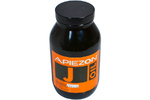 Apiezon Oil J Apiezon Oil J is not vapor diffusion pump oils but is a lubricating oil intended for use in rotating gland seals and similar equipment where a good, moderately viscous oil and low vapor pressure are required.
Apiezon Oil J Apiezon Oil J is not vapor diffusion pump oils but is a lubricating oil intended for use in rotating gland seals and similar equipment where a good, moderately viscous oil and low vapor pressure are required.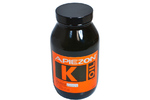 Apiezon Oil K Oil K is not vapor diffusion pump oils but is a lubricating oil intended for use in rotating gland seals and similar equipment where a good, moderately viscous oil and low vapor pressure are required.
Apiezon Oil K Oil K is not vapor diffusion pump oils but is a lubricating oil intended for use in rotating gland seals and similar equipment where a good, moderately viscous oil and low vapor pressure are required.
Apiezon® oils consist of esters or specially selected hydrocarbon fractions. They have very low vapor pressures and are very stable. They were developed for, and are ideally suited as, vapor-diffusion pump fluids.
Apiezon oils have advantages over other types of vacuum pump oils in many high vacuum applications particularly with electrical and electronic equipment. The main thermal degradation product of Apiezon oils is carbon which forms conducting layers, as distinct from the insulating layers formed by silicones and their degradation products. This is of particular importance; for example, in vacuum operations with systems containing electrical relays where a minute trace of silicone can effectively open-circuit the relay. Similarly, in apparatus involving the movement of charged particles, as in electron microscopes, mass spectrographs, or pumped X-ray machines, minute traces of silicone or silicate deposits can seriously affect the operation of the equipment. Apiezon oils are extremely efficient pumping oils for this type of equipment and deposits of degradation products have little or no harmful effect.
Spec Tables
Table 1 - Properties of Diffusion Pump Oils
| AP 201 | AP301 | Oil J | Oil K | |
|---|---|---|---|---|
| Ultimate Pressure obtainable, torr | 4x10-5 | 10-7 | ||
| Average boiling point, °C at 1 torr | 160 | 225 | ||
| Specific gravity at 20 °C Specific Gravity at 30 °C |
0.862 | 0.979 |
0.918 |
0.919 0.914 |
| Density g/mL at 10°C Density g/mL at 20°C Density g/mL at 30 °C Density g/mL at 40 °C |
0.923 0.918 0.909 0.903 |
0.921 0.916 0.912 0.904 |
||
| Flash Point, Pensky-Martins, oF closed (ASTM D93 and IP 36/63, open fire | 385 399 |
530 581 |
590 665 >700 |
645 660 >700 |
| Viscosity, dynamic at 40 °C | 3005 | 5160 | ||
| Pour Point, ASTM, oF (D97/66) | -22 | -40 | 30 | 30 |
| Coefficient of expansion per °C (a) | 0.00070 | 0.00070 | 0.00062 | |
| Coefficient of expansion per °C (b) | 0.00083 | 0.00070 | ||
| Average Molecular Weight | 310 | 470 | 1130 | 1355 |
| Refractive Index at 20 °C (c) | 1.4760 | 1.453 | ||
| Thermal Conductivity w/m/ °C | 0.167 | 0.169 | ||
| Specific heat at 25 °, cal/g | 0.46 | 0.48 | 0.46 |
(a) over 20 °C to 30 °C (ASTM D 1903/61T)
(b) over 10 °C to 40 °C
(c) ASTM D 1807-62T Sodium Line
Vapor Pressure Curves
Below shows the vapor pressure curves for the oils.
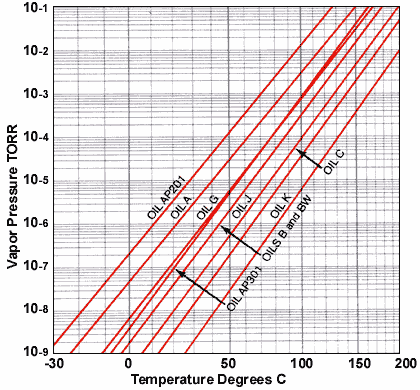
One vapor-diffusion pump oil cannot meet all the requirements of the various pumps in use. For example, for large scale pumps a robust, medium high vacuum oil is required; for high vacuum work a high quality, stable, very low vapor pressure fluid is needed; for general laboratory use there is a need for a relatively inexpensive low vapor-pressure fluid. To cover these various requirements, several grades of Apiezon vapor-diffusion pump oils are available.
Extra Info
Apiezon oils are unaffected by traces of water in the vapor being pumped and will not liberate corrosive acids.
Other special advantages of the Apiezon oils over other vapor diffusion pump fluids include their resistance to many different chemical vapors likely to be pumped and good pumping speeds to give low fine side pressures without the disadvantage of very low critical backing pressures.
Apiezon oils are highly refined, specially manufactured products, and as such are tools of the specialist in high vacuum work. To obtain maximum efficiency with the equipment, the oils must be used in the proper manner according to the technique developed in this highly specialized field. Thus vapor diffusion pumps employing Apiezon oils should not be opened to the atmosphere when the oil is hot if the life of the oil is to be utilized to the maximum. Similarly the diffusion pump heaters should not be energized when the backing pressure of the pump is in excess of 0.4 torr. Increases of pressure over short periods will not harm the oil provided the pump is of suitable design.
Certain Apiezon oils are available which have been treated with a suitable anti-oxidant. These are known as the Apiezon AP series and will withstand a considerable number (500-1,000) of atmospheric exposures while hot. Apiezon Oil AP 201 is an inhibited oil for use in booster diffusion pumps. Oil AP 301 is a synthetic ester with added inhibitors and passivators.
Apiezon oils have found several interesting uses in recent years outside the original high vacuum applications for which they were formulated. To assist research workers in evaluating Apiezon oils for new applications, a comprehensive list of physical properties is given in Table 1. Figure 1 shows the vapor pressure curves for the oils.
Precautions
PRECAUTIONS: Apiezon Products - Health and Safety
Apiezon products have been widely and safely used in vacuum distillation apparatus in both industry and laboratories for a number of years. As a result they should not present a health hazard assuming normal standards of industrial hygiene and safety are followed in their handling.
All Apiezon products are bases on petroleum products of a low order of acute toxicity. However, certain individual develop a rash after repeated contact. Therefore, it is recommended that gloves be worn to handle Apiezon. If Apiezon material is inadvertently in contact with the skin, wipe the area carefully, then cleanse thoroughly using a mild soap. Should any Apiezon products be heated for application, vent the fumes and avoid breathing the warm vapors.
In terms of explosion and fire, Apiezon products are considered non-hazardous.


